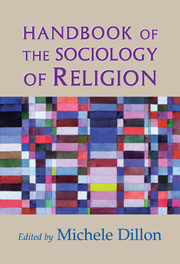Book contents
- Frontmatter
- Contents
- List of Contributors
- Acknowledgment
- Part One Religion as a Field of Sociological Knowledge
- 1 The Sociology of Religion in Late Modernity
- 2 Studying Religion, Making it Sociological
- 3 The Ritual Roots of Society and Culture
- 4 Social Forms of Religion and Religions in Contemporary Global Society
- 5 The Evolution of the Sociology of Religion
- Part Two Religion and Social Change
- Part Three Religion and the Life Course
- Part Four Religion and Social Identity
- Part Five Religion, Political Behavior, and Public Culture
- Part Six Religion and Socioeconomic Inequality
- References
- Index
5 - The Evolution of the Sociology of Religion
Theme and Variations
Published online by Cambridge University Press: 05 June 2012
- Frontmatter
- Contents
- List of Contributors
- Acknowledgment
- Part One Religion as a Field of Sociological Knowledge
- 1 The Sociology of Religion in Late Modernity
- 2 Studying Religion, Making it Sociological
- 3 The Ritual Roots of Society and Culture
- 4 Social Forms of Religion and Religions in Contemporary Global Society
- 5 The Evolution of the Sociology of Religion
- Part Two Religion and Social Change
- Part Three Religion and the Life Course
- Part Four Religion and Social Identity
- Part Five Religion, Political Behavior, and Public Culture
- Part Six Religion and Socioeconomic Inequality
- References
- Index
Summary
The beginnings of the sociology of religion are barely distinguishable from the beginnings of sociology per se. This is hardly surprising, given that its earliest practitioners were the founding fathers of sociology itself, all of whom were committed to the serious study of religion as a crucial variable in the understanding of human societies. Of course, they did this from different perspectives – the outlining of which will form an important part of the paragraphs that follow – but in the early days of the discipline, the paramount significance of religion for human living was taken for granted, if not universally approved. In later decades this significance was seriously questioned, not least by sociologists of religion themselves – a fact exemplified in their prolonged preoccupation with the secularization thesis. In the last two decades, however, the tide of opinion has begun to turn in a different direction, driven – very largely – by the overwhelming (and at times somewhat frightening) presence of religion in the modern world. Given the undeniable relevance of the religious factor to the geopolitical configurations of the new century, the sociological study of religion has gained a new urgency. New tools of analysis and new conceptual understandings are becoming increasingly necessary if sociologists are to understand (a) what is going on and (b) how they might contribute to an evidently important debate.
This trajectory – from taken-for-granted significance, through assumed decline, to a reestablished place in the canon – forms the theme of this chapter.
- Type
- Chapter
- Information
- Handbook of the Sociology of Religion , pp. 61 - 76Publisher: Cambridge University PressPrint publication year: 2003
- 14
- Cited by

